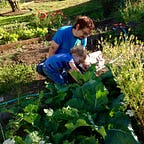What Can I Do About Climate Change TODAY?
Random notes towards a simple guide (I)
Published in
3 min readNov 27, 2018
These are notes, not meant as a final product.
What can I do about things that are happening RIGHT NOW (Acutely)?
- Climate change is here, and is happening. It’s too late to stop it, so we have to learn to withstand it as best we can.
- Don’t engage with climate change deniers — it’ll just frustrate you. They’re either going to come around on their own or face the consequences.
- The over-arching climate problem is chronic, like heart disease, but the symptoms are manifesting acutely, like a fever or cough.
- Protesting and voting are essential, but they’re like chemotherapy. They’re not going to address acute problems. They may not even address chronic problems. Politics may even make the situation worse. The change that happens via protesting/voting is so incremental that suggesting they’re the ‘best way forward’ makes people feel disempowered.
- Doing the usual (“more efficient lightbulbs!” “buy a hybrid car!”) often only applies to those who have the resources/time to make those changes. And, again, not going to help with acute climate change symptoms.
- All of the same applies to donating to Climate Justice orgs. It’s great, do it if you can, but the change is incremental and not everybody is privileged enough to be able to do so.
So, what can you do right now (“right now” being relative)?
- Do or find a simple “climate impact assessment” for your house/neighborhood/city/region. (Instructions/resources forthcoming.)
- Learn one edible plant that grows near you in the wild, and one way to prepare it. Learn what’s going to happen to the plants and animals in your area based on climate. (Instructions/resources forthcoming.)
- Stockpiling consumables is great, but consider small investments in small preparedness tools (LifeStraw, etc.). (Instructions/resources forthcoming.)
- Will you be Too Hot? Learn how to get cooler by studying traditional methods. Make a plan for evacuation if you’re in a fire-prone area. Fireproof your surroundings as much as possible. (Instructions/resources forthcoming.)
- Will you be Too Dry? Learn how to collect water from your landscape. Learn how to conserve it in your house/living space. (Instructions/resources forthcoming.)
- Will you be Too Cold? Learn how to get warmer by studying traditional methods. (Instructions/resources forthcoming.)
- Will you be Too Wet? If you’re on the coast, investigate sea level rise and how it may impact you. Will you one day need to leave? If not, are you in a flood zone? What about erosion/mudslides? (Instructions/resources forthcoming.)
- Will you be Too Crowded? If you’re in an area that will be less impacted than others, you may see climate refugees. Where will they come from? Are there local organizations who can help them?
- Doing even ONE of these things will help you be more prepared to withstand the potentially uncomfortable future.
- Teach all of this to children.
